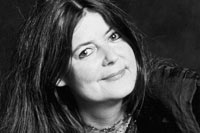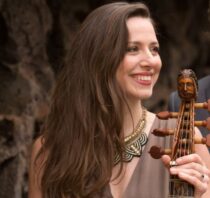Ting Lookout at UBC Botanical Garden
Jonathon Adams, Baritone, Traditional Drum; Susie Napper, Bass Viol; Mélisande Corriveau, Treble, Bass Viols and Recorder
The nightingale, at liberty to sing of love and longing, is the star of this program devoted to songs of nature and nurture. These multicultural songs and gigues encompass many aspects of Canadian history with French, Scottish, Irish, and English colours woven into a complex and beautiful tapestry. The Métis songs, which survived in the memories of travelers from Quebec to the Prairies, are in Michif, French, and English. The earliest songs can be traced back to their European origins, with melodies that are remarkably similar to airs de cour, a form popular in 17th century France, that were often accompanied by viols. We hope you’ll enjoy hearing these beautiful songs, often plaintive, of the Rossignol Sauvage, a voice of the Métis people.
This concert is generously supported by Zelie & Vincent Tan
Please note, this concert is free with garden admission to the UBC Botanical Garden. The same concert will be performed twice, at 11 AM and 1 PM.
Programme
Traditional Cree
Cree Song
Sieur de Ste-Colombe (1640-1700)
Les Roulades
Traditional Métis
J’ai fait une maitresse*
Les petits oiseaux*
François Couperin (1668-1738)
Musètes de Choisi et Taverni
Jean Boyer (v. 1600-1648)
Que feray-je ? Que diray-je ?*
Louis Couperin (1626-1661)
Fantaisie pour les violes
Traditional Métis
La montagne sauvage*
Traditional Métis
En montant la rivière*
Sébastien Le Camus (ca. 1610-1677)
Amour Cruel*
Marin Marais (1656-1728)
Fantasie en écho
Andre Campra (16160-1774)
Doux échos
Traditional Métis
Le petit Rossignol Sauvage*
Michel Lambert (1619-1696)
Vos Mèpris
Traditional Cree
Cree Song
* Arrangement by Susie Napper
Programme Notes
The nightingale, at liberty to sing of love and longing, is the star of this programme devoted to songs of nature and nurture! Multicultural, the songs, and gigues encompass many aspects of Canadian history with French, Scottish, Irish, and British colours are woven into a complex and beautiful tapestry.
Of their ambiguous status, little is known about the artistic life of the Métis and their unique contribution to Canadian culture during the 17th and 18th centuries.
***
The Métis songs, which thrived in the memories of travelers from Quebec to the Prairies, are in Michif, French, and English. The earliest songs can be traced back to their European origins. With a purely aural legacy and still sung by elderly Métis, the songs are being collected by Lynn Whidden at the University of Manitoba, Brandon. As with most traditional songs, the melody remains fairly constant but the improvised accompaniment changes as styles evolve. The earliest melodies are remarkably similar to airs de cour, a form popular in 17th century France, that were often accompanied by viols.
Music by composers of airs de cour can be found in the private collections of music found in Quebec’s family libraries. Henry Du Mont, Jean-Baptiste Morin, André Campra, Jean-Batiste Lully, and Marc-Antoine Charpentier also composed wonderful viol music some of which are featured in this concert.
***
Viols in Quebec? The French nuns in the Quebec convents were dedicated to the education of both European and indigenous children. In 1640, Mother Marie de l’Incarnation wrote that one of their indigenous wards, Agnés Chablikuchich had made great progress….in playing the viol. We know that instruments were abundant in Quebec. A cache of twelve viols was found in the vaults of the Hôpital générale in Quebec City during the 19th century. Historically, however, as fashion dictated, most viols were cut down or built up to be transformed into violins, violas, and cellos by the end of the 18th century.
Imagination and creative thinking are intrinsic to a programme dependant on joining the dots! We hope you’ll enjoy hearing these beautiful songs, often plaintive, of the Rossignol Sauvage, a voice of the Métis people!

Jonathon Adams, Baritone, Traditional Drum
EMV’s 2021 Artist-in-Residence, Jonathan Adams was born in amiskwaciwâskahikan (Edmonton, Canada). Jonathan is a Two-Spirit, nêhiyaw michif (Cree-Métis) baritone and performance artist. In concert, they have appeared as a soloist with Philippe Herreweghe, Sigiswald Kuijken, Hans-Christoph Rademann, Václav Luks, Ensemble BachPlus, Vox Luminis, il Gardellino, and B’Rock Orchestra at Opera-Ballet Flanders. Jonathon is a featured soloist in the film MESSIAH / COMPLEX produced by Against the Grain Theatre and the Toronto Symphony Orchestra (2020). Jonathon was a fellow of the Netherland Bach Society in 2020 and performs regularly with Amsterdam Baroque Orchestra & Choir. Future solo engagements include recording and concerts with il Gardellino, concerts with Servir Antico, Les Voix Humaines, Ensemble Caprice, L’Orchestre Baroque Arion, Studio de Musique Ancienne de Montréal, L’Harmonie des Saisons, and Tafelmusik Baroque Orchestra amongst others.
Thanks to a long term ‘Creating, Knowing and Sharing’ grant from the Canada Council for the Arts, 2021 witnessed the world premiere of Adams’ performance piece nipahimiw / the plaint with collaborators Christi Belcourt, Reneltta Arluk, Evan Ducharme, Susie Napper and Catalina Vicens. nipahimiw / the plaint is slate for presentation at the Art Gallery of Ontario, Vancouver’s UBC First Nations Longhouse, Montreal’s McCord Museum, Quamajuq Inuit Art Museum (Winnipeg) and the National Gallery of Canada in Ottawa.

Susie Napper, Bass Viol
Cellist, gambist, continuo player par excellence, Susie Napper is known for her colorful, even controversial performances of both solo and chamber repertoire of the 17th and 18th centuries. Having spent her childhood in an artistic milieu in London, in her late teens she moved to New York to study at the Juilliard School, then to the Paris Conservatoire. San Francisco followed, where, after a foray into contemporary music, she co-founded and directed the Philharmonia Baroque Orchestra.
Since then, she has spent two decades with a foot on either side of the Atlantic as principal cellist with several groups including Stradivaria in France, the Studio de Musique Ancienne de Montréal and Les Boréades in Montreal, and the Trinity Consort of Portland. Her concert tours have taken her as far afield as China, Japan, New Zealand, India, the Middle East, as well as most European countries.
As a member of the very active viol duo Les Voix humaines, she has discovered a new facet of musical expression in the form of musical arranging, thus providing an endlessly fascinating new repertoire for two viols. Susie Napper teaches at McGill University, and founded the Festival international Montréal Baroque which is presented in Montreal in June since 2001. She was awarded the Prix Opus 2002 for “Personality of the Year” by the Conseil québécois de la musique.
Her recordings, which include most of the known repertoire for two viols, can be heard on Harmonia Mundi, EMI, Erato, ADDA, CBC Records, Naxos, and most notably on the ATMA label. But her true vocation is not on the concert stage or the recording studio. The kitchen is the center of her domain, where she creates dishes both colorful and controversial for her own pleasure as well as that of her guests.

Mélisande Corriveau, Treble, Bass Viols and Recorder
A specialist in early-music performance, multi-instrumentalist Mélisande Corriveau has been praised for her exceptional musical mastery. She is frequently a guest at major festivals in both North America and Europe, and is an active concert, touring, and recording artist. She regularly performs with a number of celebrated ensembles, and is a member of the ensembles Masques (France), Les Voix humaines, Sonate 1704, and Les Boréades de Montréal. As a soloist, she has been featured with Les Violons du Roy, National Art Center Orchestra, Montreal Symphony Orchestra,Tafelmusik Baroque Orchestra, and has toured with Jordi Savall and Ensemble Hespèrion XXI. Her discography comprises some 50 titles on various labels. Her discs with harpsichordist Eric Milnes - Pardessus de viole and Marin Marais : Badinages - have won numerous accolades including Opus Prizes for early-music CD of the year and classical disc of the year by ICI Radio- Canada (2016). Mélisande Corriveau and her partner Eric Milnes co-direct the two time Juno award-winning vocal and instrumental ensemble L’Harmonie des saisons, which they founded in 2010. In 2014, Ms. Corriveau completed, with honors, a doctorate in pardessus de viole performance at the Université de Montréal. She is recognized as one of the world’s few specialists on this instrument.


